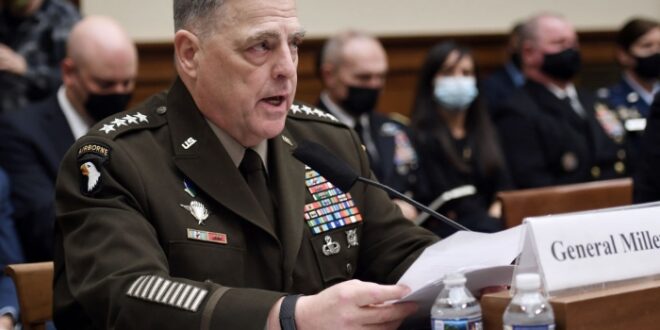Government shutdown? No. Votes in the House? Not until at least 9 p.m. tonight. And on the Senate side, as Marianne LeVine wrote, “Democrats are desperately trying to make lemonade out of the bag of lemons Joe Manchin handed them today. Senate Democrats spun away Manchin’s utter rejection of their $3.5 trillion spending dreams and embrace of a $1.5 trillion plan as a positive development, saying that it offered them a path forward for negotiation on a potential deal. When that deal will come to fruition, however, is anyone’s guess.”
‘OUT OF OPTIONS’ — Six to 36 months. That’s how long it could take al Qaeda to reconstitute in Afghanistan, Joint Chiefs Chair Gen. Mark Milley said in a hearing Wednesday.
It was a prediction from the nation’s highest-ranking military officer — one that, particularly after the fall of Kabul, indicates the U.S. may have trouble figuring out what’s coming next.
Milley’s estimate is most likely gut instinct, said Colin Clarke, director of policy and research at The Soufan Group, a nonprofit focused on global security. “My concern is that we’ve gotten so much wrong with respect to Afghanistan, that those suggestions that it could take 12 or 18 months are also going to be wrong, and that we’re going to be looking at a much shorter time frame,” Clarke said.
It’s hard to calculate the speed at which the terrorist group will once again increase its numbers and operational capacity in Afghanistan, Charles Lister, director of counterrorism at the Middle East Institute, said — something he sees as inevitable after the United States’ exit that allowed al Qaeda’s old ally, the Taliban, to take power.
Much of the group’s central leadership is currently based in Iran, Lister said. The question will be whether or not these leaders will be able or allowed to return.
If the group could successfully get its new leader into Afghanistan — something not guaranteed, but definitely feasible — it would have global ramifications, Lister said. With al Qaeda and Iran’s complex history, experience has taught the group to never trust leadership instructions coming from Iran, Lister said. Since Ayman al-Zawahiri, the group’s global leader, is reportedly in poor health, al Qaeda is already thinking about succession.
Even with al Qaeda’s potential revitalization in Afghanistan, the group looks nothing like it did in 2001. The U.S. crippled al Qaeda’s central leadership, successfully keeping it at bay for nearly two decades.
But that doesn’t mean it’s smaller, Lister said. Al Qaeda has actually expanded, deeply embedding itself into local communities in countries like Somalia, Yemen and potentially in northern Syria.
Al Qaeda’s strategy has changed, too. The group has created a security blanket through its community integration, Lister said. Their goals have also become more regional and localized, with less focus on taking down the West.
That doesn’t mean the threat still doesn’t exist.
Many counterterrorism experts worry about groups like al Qaeda and ISIS-K becoming empowered in a Taliban-led Afghanistan. Running a country isn’t an easy feat, and the Taliban won’t have the bandwidth to fight off groups like ISIS-K, leading them to lean on their longtime ally yet again for back-up.
“The Taliban’s bandwidth is going to be maxed out. So, if there is an al Qaeda revival and al Qaeda does still seek to target the West, what can the Taliban actually do about it?” Clarke said. “The Taliban needs al Qaeda, and al Qaeda needs the Taliban.”
The warning signs are already there, as foreign fighters from countries like Iran and Pakistan flood Afghanistan and join ISIS-K and al Qaeda forces. Plus, Clarke worries the environment in Afghanistan is a breeding ground for more groups to pop up that may be more focused on staging an attack on the United States.
The U.S. is more prepared to prevent an attack like we saw on Sept. 11. But it’s also true that the disconnect between intelligence and military strategy will only be exacerbated without U.S. ground troops, Clarke said.
The fact that the U.S. is in talks to use Russian bases for Afghan counterterrorism operations tells both Clarke and Lister that America is not well-positioned to respond to a resurgent al Qaeda in the country.
“We are out of options. Our only options are in the Gulf, which is like a six-plus hour flight for a drone to get to Afghanistan and in the counterterrorism world that is too long,” Lister said. “Targets emerge quickly, and they can disappear just as quickly. And if we spend six hours flying to Afghanistan, the likelihood of us being able to act on anything is pretty slim.”
 Eurasia Press & News
Eurasia Press & News



